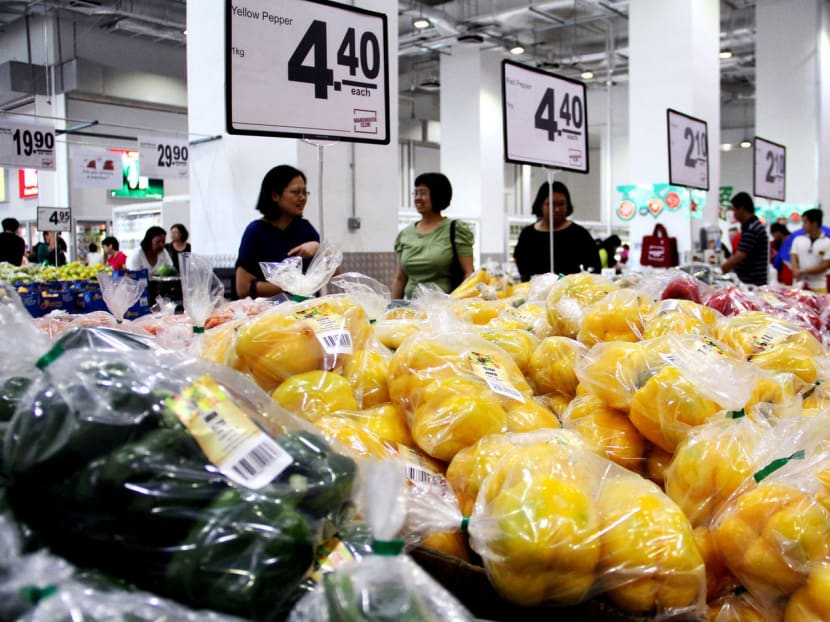Inflation slows in August, monetary policy to remain unchanged
SINGAPORE — Consumer prices rose at a slower pace last month than the previous month, largely reflecting the fall in private road transport inflation, with most economists saying that the central bank is expected to leave monetary policy unchanged at its meeting next month.

Food inflation last month moderated to 1.2 per cent from July’s 1.4 per cent, on account of smaller increases in the prices of both non-cooked food and prepared meals. TODAY file photo
SINGAPORE — Consumer prices rose at a slower pace last month than the previous month, largely reflecting the fall in private road transport inflation, with most economists saying that the central bank is expected to leave monetary policy unchanged at its meeting next month.
The All-Items Consumer Price Index (CPI) eased to a 0.4 per cent year-on-year increase last month from the 0.6 per cent rise in July, said the Monetary Authority of Singapore (MAS) and the Ministry of Trade and Industry (MTI) in a joint statement yesterday. Economists in a Reuters poll had expected the gauge to rise at the same pace as it did in the previous month.
“Most components of inflation eased in August, including food, clothing & footwear, healthcare, transport and communications, which more than offset a slight pick-up in accommodation inflation,” said Nomura Securities analysts Euben Paracuelles, Lavanya Venkateswaran and Brian Tan.
Last month, MAS core inflation — which excludes the costs of accommodation and private road transport — moderated to 1.4 per cent year-on-year, from 1.6 per cent in July, due to lower food and retail inflation.
Saying that the August CPI figures are not “runaway” numbers, United Overseas Bank economist Francis Tan added that the MAS is likely to maintain its current neutral appreciation stance for the Singapore dollar nominal effective exchange rate (S$NEER) at its semi-annual policy meeting next month.
He noted that the central bank had stated in its last meeting in April that its existing policy stance was “appropriate for an extended period and should ensure medium-term price stability.”
“The central bank is not expecting runaway prices, and although current economic conditions are better than just a year ago, the weakness in the labour market will set a limit on cost-pushed inflation,” Mr Tan said.
The MAS and MTI said in their statement that overall domestic sources of inflation remained relatively muted.
“Conditions remain slack in the labour market and this is expected to dampen underlying wage pressures, even as commercial and retail rents have continued to ease. The subdued economic environment will also limit the extent to which businesses pass on higher costs to consumers,” they said.
Other economists including Mr Sanjay Mathur at ANZ Bank also said the MAS is likely to stand pat on policy next month.
“The inflation data once again confirms that weak domestic demand is weighing on the pricing power of the corporate sector and that there is little reason for the MAS to relinquish its currently neutral exchange rate policy stance,” Reuters quoted Mr Mathur as saying.
However, Maybank Kim Eng economists Chua Hak Bin and Lee Ju Ye offered a minority view that the MAS would likely shift the monetary policy band to a “slight appreciation bias” in its October meeting, based on creeping core inflation and the Republic’s expected solid economic growth.
“Third-quarter gross domestic product growth may come in at around 3.5 to 4 per cent by our estimates, strengthening from 2.9 per cent in the second quarter. The S$NEER is currently trading at around 1 per cent above the implied mid-point, by our estimates,” Mr Chua and Ms Lee said.
Last month, private road transport inflation eased to 2.6 per cent from the 3.5 per cent increase in July. This was due to a dissipation of the base effects related to the expiry of one-year road tax rebates in August last year.
Food inflation moderated to 1.2 per cent from July’s 1.4 per cent, on account of smaller increases in the prices of both non-cooked food and prepared meals.
The cost of retail and other goods, including water, rose by 0.9 per cent, lower than the 1.2 per cent recorded in the previous month, reflecting more modest increases in clothing and footwear prices.
Services inflation was unchanged from the previous month at 1.4 per cent in August, as the rise in holiday expenses was offset by smaller increases in the costs of medical and dental treatment as well as education services.
Meanwhile, the cost of accommodation fell by 3.9 per cent last month, moderating from the 4.1 per cent decline in July, as a result of a larger increase in the cost of housing maintenance and repairs.
For 2017, the MAS and MTI maintained the forecasts for core inflation and headline inflation at 1 to 2 per cent and 0.5 to 1.5 per cent, respectively.





